CS in 2019-2020
| Group: | CS |
| Courses: | |
| External Link: | Info |

The mission of the Control Systems (CS) group is to be an internationally recognized centre of research in systems and control, where contributions to fundamental theory are combined with advancing innovative technological applications in a selected number of domains, in cooperation with relevant industrial partners.
The fundamental research of CS is directed towards the following research lines:
• Data-driven modelling in dynamic networks
• Modelling and control of linear parameter varying systems
• Spatial-temporal multi-physics systems and model reduction
• Data analytics and machine learning
• Constrained and interconnected systems
• Model-based control and optimization
• Control of cyber-physical systems
Application domains range from multi-physics high-tech/mechatronic systems, automotive systems, energy and power converter systems to industrial process control systems. In each of these domains CS collaborates with leading companies contributing our fundamental knowledge to their innovation roadmaps.
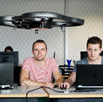
Our practical Autonomous Motion Control (AMC) lab contains the infrastructure for verifying and demonstrating applied research and/or fundamental research for real-world problems. Research topics are, amongst others, vehicle control, model predictive control, distributed optimization, formal testing of algorithms, formal methods for stochastic and/or uncertain dynamic environments,
Exciting and challenging internship- and MSc projects are now available in our 8 Research labs.
• Constrained Control of Complex Systems (C3S) – Mircea Lazar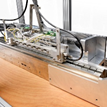
The C3S Lab focuses on stability and control of complex dynamical systems subject to constraints. Current projects of interest consider the following topics: digital control of high-precision power converters for electron microscopy (in collaboration with EPE); distributed control of interconnected power electronics within a microgrid (collaboration with EPE); active EMI compensation for power electronics using feedback control (collaboration with EES); distributed nonlinear model predictive control for power networks; energy-efficient distributed control of vehicle platoons; design and testing of MPC controllers in the AML lab using a LEGO Formula 1 car; nonlinear control of a linear motor applied to an industrial ASML linear motor set-up, available for experiments.
• Control of High-precision Mechatronic Systems – Hans Butler
This Lab focusses on control techniques in lithographic scanners, in particular related to high-accuracy positioning systems. Has its own practical lab.
• Dynamic Networks: Data-Driven Modeling and Control – Paul Van den Hof
Methods and tools for the modeling of dynamic networks on the basis of operational data are developed, to be used as a basis for model-based operations as surveillance, detection, monitoring and control. Applications in e.g. smart power grids.
• Dynamics and Control for Electrified Automotive Systems – Tijs Donkers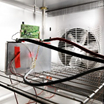
Research in the area of vehicle energy management, where distributed optimization and (model predictive) control are used to control the energy flows inside a vehicle to minimize the overall energy consumption. This leads to a higher fuel economy of a conventional vehicle or a larger driving range of an electric vehicle. Research also includes modelling and control of batteries, such as optimal charging, cell balancing and state estimation. Uses the AMC lab.
• Formal methods for control of cyber-physical systems – Sofie Haesaert
In this lab, we develop theory and engineering methods for the design and formal verification of control in cyber-physical systems (CPS). Applications include robot navigation in uncertain environments, design and verification of stochastic and hybrid systems.
Uses the AMC lab.
• Machine Learning for Modelling and Control – Roland Toth & Maarten Schoukens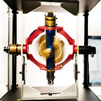
Focus on data-driven modelling (identification) and control of complex physical/chemical systems, in particular in the high-tech and process technology domains.
Uses the AMC lab.
• Smart Process Operations and Control Lab (SPROC) – Leyla Ozkan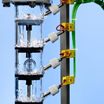
SPROC Lab focuses on challenges critical for the dynamic and flexible operation of chemical processes.
Has its own practical lab.
• Spatial-Temporal Systems for Control – Siep Weiland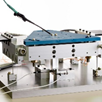
This research focuses on the modeling of multi-physics dynamic systems. Has its own practical lab.
More information about our group, labs and specialization courses is available on our Research website: https://www.tue.nl/en/research/research-groups/control-systems/